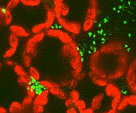Plant Pathology, Department of

Department of Plant Pathology: Faculty Publications
Document Type
Article
Date of this Version
2012
Citation
Toxins 2012, 4, 1157-1180; doi:10.3390/toxins4111157
Abstract
Deoxynivalenol (DON) is a mycotoxin produced by the plant pathogenic fungi Fusarium graminearum and F. culmorum. These and other closely related fungi cause a disease known as Fusarium head blight (FHB) in small grain cereals. Other mycotoxins produced by FHB-causing fungi include nivalenol, T-2 toxin, and zearalenone. Ingestion of mycotoxin-contaminated food and feed can lead to toxicosis in humans and animals, respectively. DON is the predominant and most economically important of these mycotoxins in the majority of small grain-producing regions of the world. This review examines the factors that influence DON accumulation in small grain cereals from an agricultural perspective. The occurrence and economic importance of FHB and DON in small grain cereals, epidemiological factors and cereal production practices that favor FHB development and DON accumulation in grain under field conditions, and regulatory/advisory standards for DON in food and feed are discussed. This information can be used to develop strategies that reduce DON accumulation in grain before harvest and to mitigate the human and animal health risks associated with DON contamination of food and feed.


Comments
Wegulo in MDPI Toxins (2012) 4. Copyright © 2012, the author. Licensee MDPI, Basel, Switzerland. Open access, Creative Commons Attribution license 4.0.